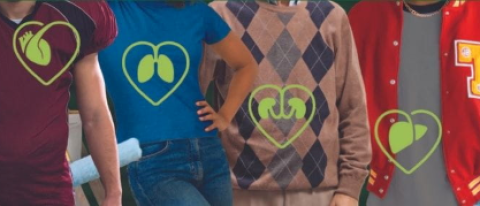Organ Donation
Organ donation has the power to save lives and make a profound difference for those in need of life-saving transplants. Everyone has the potential to become an organ donor, but only 1-2% of deaths in hospital are eligible. In most cases, organ donation requires someone to be admitted to an Intensive Care Unit (ICU) and on a ventilator. Regardless of age or health status you may be eligible to be a donor. Talking to your family about donation will help them feel confident about honouring your wishes. Resources to help guide discussions about talking to family can be found on the Family/Loved ones Support webpage.
It is important to keep in mind that even if you or your loved ones are registered to donate, the donation conversation will not occur until all avenues are explored to save the life of you or your loved one. Organ donation is only discussed with your family after end of life care discussions are had. At this point, a donor coordinator will talk to loved ones about donation and consent.
Your Donor Coordinator will talk you through the next steps. As with donating blood, the potential donor is screened; a questionnaire, bloodwork and tests are completed. The coordinators will then work to find recipients for organs. This process takes approximately 1 to 3 days.
Organ donation is a gift that can help improve the lives of others. There are many conditions that can be impacted by organ donation. The following are a few of the most common conditions:
- Kidney: Chronic Kidney Disease
- Liver: Hepatitis, Cirrhosis
- Lungs: Cystic Fibrosis, Pulmonary Fibrosis
- Heart: Cardiomyopathy, Valve disease
- Pancreas: Diabetes
- Small Bowel: Short Gut Syndrome, Crohn's Disease
Types of Organ Donation
There are three types of organ donation:
- Neurologic Determination of Death
- Circulatory Death and MAiD
- Living Organ Donation
Death Determination by Neurologic Criteria (DNC)
This is often referred to as Brain Death. This occurs when there is a traumatic injury to the head or brain. There is no longer blood flow to the brain, and it loses its ability to maintain vital functions.
Two doctors will perform clinical tests to determine if someone is brain dead. If a person is brain dead, this means they are legally dead. Their organs would still function while on life support in the ICU. The organs that may be able to be donated are:
- Kidneys
- Liver
- Pancreas
- Lungs
- Heart
- Small Bowel
Death Determination by Circulatory Criteria (DCC)
This occurs when a person has a serious injury, or an illness that is not survivable, and there is no chance of meaningful recovery. The medical team will have a discussion around goals of care and end of life discussions. This may include transitioning to comfort care. Comfort care includes stopping life support, allowing for a natural death to happen. Before stopping life support, a discussion about organ donation may be had.
The person would have to pass away within a certain time frame to make organ donation possible. The organs that may be able to be donated are:
- Kidney
- Liver
- Lungs
- Pancreas (islets)
Medical Assistance in Dying
For those that are receiving or planning for Medical Assistance in Dying (MAiD), organ donation can be a part of the end of life options, though MAiD is never done for the purpose of organ donation. You must be fully accepted to the MAiD program before the Donation team can be involved in your care. MAiD provisions would need to occur at the hospital to be an organ donor. If this is something you would be interested in, talk to your family, and speak with your MAiD providers. The organs that may be able to be donated are:
- Kidney
- Liver
- Lungs
- Pancreas (islets)
Living Kidney Donation
Living kidney donation is facilitated through the Saskatchewan Transplant Program. For information about Living Kidney Donation, visit the Living Organ Donation webpage.
SHA Donation Program Regina
Regina General Hospital
1440 14th Ave
Regina, SK S4P 0W5
Phone: 306-766-3591
Email: DonationProgram.Regina@SaskHealthAuthority.ca
SHA Donation Program Saskatoon
Royal University Hospital
103 Hospital Drive
Saskatoon, SK S7N 0W8
Phone: 306-655-0315
Email: SHA.DonationProgram@SaskHealthAuthority.ca



